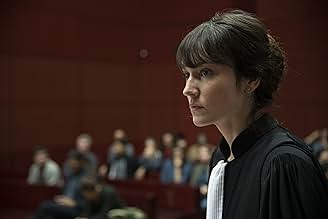La fille au bracelet
- 2019
- Tous publics
- 1h 35min
NOTE IMDb
6,6/10
2,5 k
MA NOTE
Une adolescente est jugée pour le meurtre de sa meilleure amie.Une adolescente est jugée pour le meurtre de sa meilleure amie.Une adolescente est jugée pour le meurtre de sa meilleure amie.
- Récompenses
- 3 victoires et 5 nominations au total
Pascal Garbarini
- Le Président du Tribunal
- (as Pascal-Pierre Garbarini)
Histoire
Le saviez-vous
- AnecdotesAnaïs Demoustier, who plays the prosecutor, is the director's sister. Chiara Mastroianni, who plays Lise's mother, is the daughter of Marcello Mastroianni and Catherine Deneuve.
- ConnexionsRemake of Acusada (2018)
Commentaire à la une
The French court drama 'La fille au bracelet' (the English title is 'The Girl with a Bracelet') made in 2019 by Stéphane Demoustier starts from a situation that is one of the nightmares of any parent. How do a couple of parents face the fact that their daughter, just out of adolescence, is accused of a horrible crime, the murder of her best friend? Can family, marriage hold? Can parents cope with doubts about their daughter's possible guilt and remorses over the fact that from one point on they can no longer protect her in the face of the justice machine? 'La fille au bracelet' which adapts and relocates an Argentine film (which I have not seen) treats this topic with discretion and sensitivity.
The opening scene of the film looks like a copy of the scene that opens the Romanian film ' Arest' by Andrei Cohn that I saw recently. The scene takes place on a beach, is filmed from afar in one shot. A family spends a quiet afternoon by the sea. The police appear, snatching one of the people from normal life in order to throw her into a completely different reality, in prison. From here on the two films are different. The arrested person is Lise, a 16-year-old teenager ( Melissa Guers), the daughter of a middle-class couple (Roschdy Zem, Chiara Mastroianni). The family's life turns into a Kafka-esque nightmare, being confronted with the girl's pre-trial detention for six months followed by a legal procedure that after two years leads to the trial in which Lise is accused of murder. Most of the film takes place in the courtroom. However, more questions about the morality of the accused seem to be put before the court than evidence to prove guilt. The girl's lack of communication does not help her face the accusator, the judge and the jurors. Is this the natural shock that a teenager torn from normal life and thrown into legal proceedings under a terrible accusation goes through, or maybe it is a proof of guilt? Doubts sneak even into the minds of the parents.
I liked the approach of director Stéphane Demoustier. He films the court scenes as a TV broadcast, a neutral-style justice drama. Even the scenes that take place between the parents, or between the parents, the girl and her brother are devoid of sentimentality and do not give explicit answers to all the questions. Precisely due to the director's objectivity, the spectators, like the jurors of the trial, can form their own opinions. Perhaps the lawyer's plea contains the key to watching the film: how much do we understand, parents and grown-up people, of the problems and feelings of young people, how much do we remember and how much did we forget about how we were at their age? Minimalism also characterises the way actors are directed. Melissa Guers as Lisa makes an exceptional debut which is hopefully the beginning of a formidable career. Roschdy Zem and Chiara Mastroianni are very well cast in the roles of parents, reserved and keeping their troubles inside. Anaïs Demoustier (the director's sister) also appears in this film in a very different role from the one in 'Alice et le maire' in which I liked her enormously. I even wondered while watching what the heroine there would have thought about this prosecutor who seems to be trying to convict a young woman of murder without concrete evidence, practically asking the accused to prove her innocence instead of her, the prosecutor proving the guilt beyond of any doubt, as required by the laws of justice. 'La fille au bracelet' is the kind of movie that is sometimes said to resemble a long episode of a TV series. In this case, however, it is much more, it is a court drama with a story and characters that accompany the viewers long after the screening of the film is over.
The opening scene of the film looks like a copy of the scene that opens the Romanian film ' Arest' by Andrei Cohn that I saw recently. The scene takes place on a beach, is filmed from afar in one shot. A family spends a quiet afternoon by the sea. The police appear, snatching one of the people from normal life in order to throw her into a completely different reality, in prison. From here on the two films are different. The arrested person is Lise, a 16-year-old teenager ( Melissa Guers), the daughter of a middle-class couple (Roschdy Zem, Chiara Mastroianni). The family's life turns into a Kafka-esque nightmare, being confronted with the girl's pre-trial detention for six months followed by a legal procedure that after two years leads to the trial in which Lise is accused of murder. Most of the film takes place in the courtroom. However, more questions about the morality of the accused seem to be put before the court than evidence to prove guilt. The girl's lack of communication does not help her face the accusator, the judge and the jurors. Is this the natural shock that a teenager torn from normal life and thrown into legal proceedings under a terrible accusation goes through, or maybe it is a proof of guilt? Doubts sneak even into the minds of the parents.
I liked the approach of director Stéphane Demoustier. He films the court scenes as a TV broadcast, a neutral-style justice drama. Even the scenes that take place between the parents, or between the parents, the girl and her brother are devoid of sentimentality and do not give explicit answers to all the questions. Precisely due to the director's objectivity, the spectators, like the jurors of the trial, can form their own opinions. Perhaps the lawyer's plea contains the key to watching the film: how much do we understand, parents and grown-up people, of the problems and feelings of young people, how much do we remember and how much did we forget about how we were at their age? Minimalism also characterises the way actors are directed. Melissa Guers as Lisa makes an exceptional debut which is hopefully the beginning of a formidable career. Roschdy Zem and Chiara Mastroianni are very well cast in the roles of parents, reserved and keeping their troubles inside. Anaïs Demoustier (the director's sister) also appears in this film in a very different role from the one in 'Alice et le maire' in which I liked her enormously. I even wondered while watching what the heroine there would have thought about this prosecutor who seems to be trying to convict a young woman of murder without concrete evidence, practically asking the accused to prove her innocence instead of her, the prosecutor proving the guilt beyond of any doubt, as required by the laws of justice. 'La fille au bracelet' is the kind of movie that is sometimes said to resemble a long episode of a TV series. In this case, however, it is much more, it is a court drama with a story and characters that accompany the viewers long after the screening of the film is over.
Meilleurs choix
Connectez-vous pour évaluer et suivre la liste de favoris afin de recevoir des recommandations personnalisées
- How long is The Girl with a Bracelet?Alimenté par Alexa
Détails
- Date de sortie
- Pays d’origine
- Site officiel
- Langue
- Aussi connu sous le nom de
- The Girl with a Bracelet
- Lieux de tournage
- Palais de justice, Nantes, Loire-Atlantique, France(courthouse exterior and interior locations)
- Sociétés de production
- Voir plus de crédits d'entreprise sur IMDbPro
Box-office
- Budget
- 3 300 000 € (estimé)
- Montant brut mondial
- 2 593 818 $US
- Durée1 heure 35 minutes
- Couleur
- Rapport de forme
- 1.66 : 1
Contribuer à cette page
Suggérer une modification ou ajouter du contenu manquant


![Regarder Bande-annonce [VO]](https://m.media-amazon.com/images/M/MV5BZTBlZWVmZGMtZGJlZi00OWEwLTgzM2ItM2E4ZTIwNWUxNzUxXkEyXkFqcGdeQXRyYW5zY29kZS13b3JrZmxvdw@@._V1_QL75_UX500_CR0)












